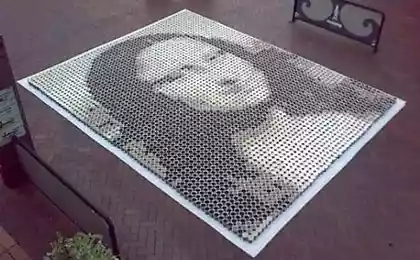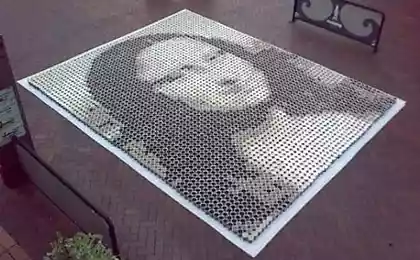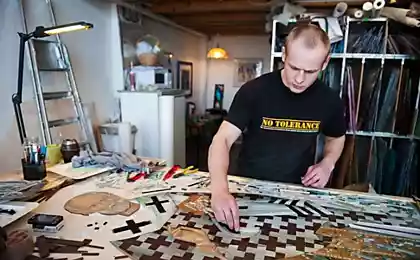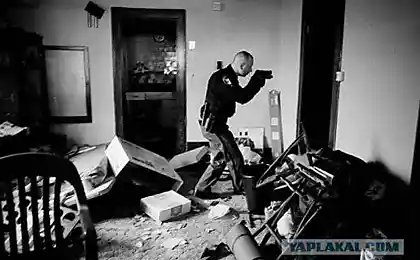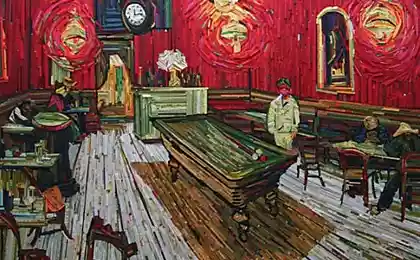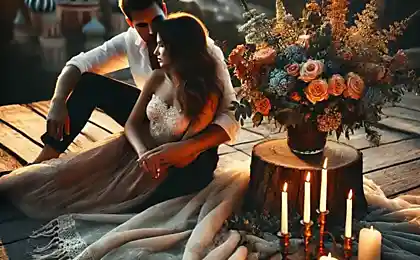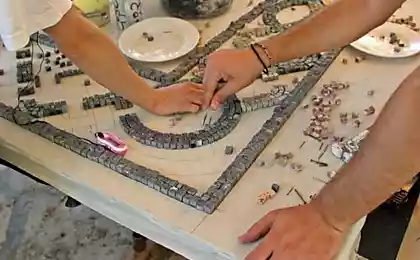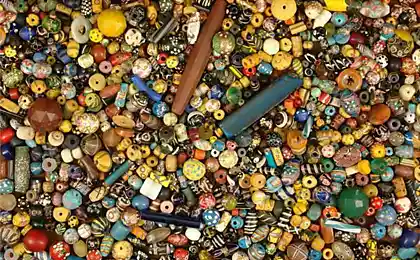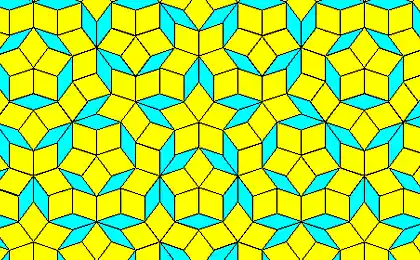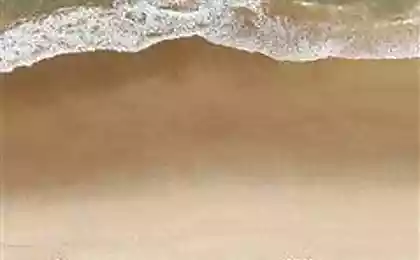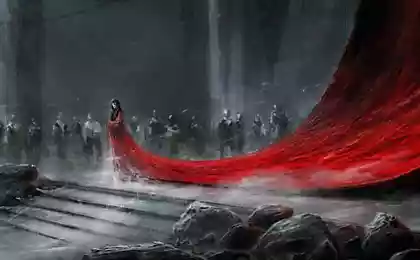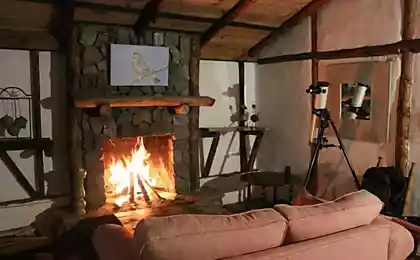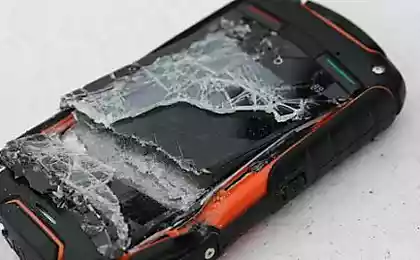2688
Mosaic: glass painting
Author: "We often say, all pieces of the puzzle came together. Of course, we mean that all events are perfect together into a single image. However, without our help is unlikely to be a puzzle of events developed so successfully. In this mosaic of our reality is not much different from the real mosaic - lined with paintings of tens, hundreds or even thousands of tiny pieces. How to create such pictures, I was lucky enough to see one of the workshops in stained glass studio "Alexandria", where I was invited by the chief artist studio Leila Al-Numan ».
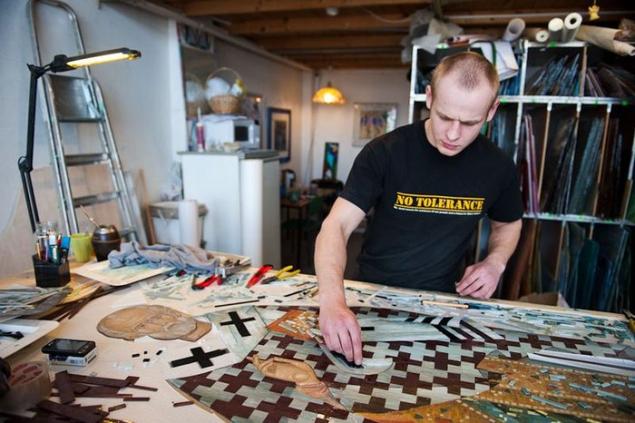
Twenty years ago, "Alexandria" was created as a stained glass studio, and I have already talked about how to work here in this technique. When you create a stained glass window is used very different - from transparent to dense. Over time, the remnants of dense, opaque glass accumulated quite a lot, and in the studio decided to try to put them in business - to begin to lay out the mosaic. From that moment has passed six years, and now the mosaic can be called the second core competence studio. For such important work had been trained and equipped master workshops.
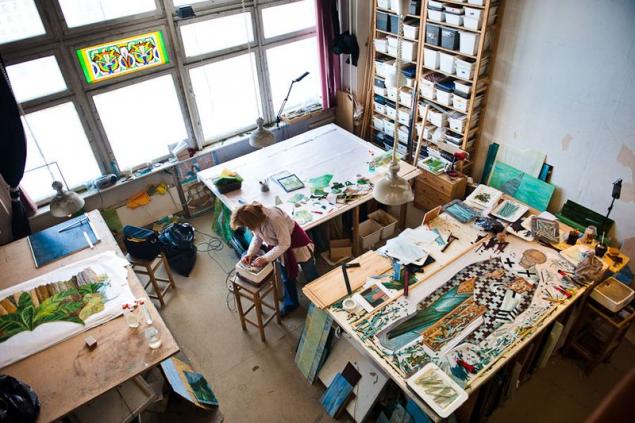
In one of these workshops - a spacious room with high ceilings - I saw gather mosaic. Light rained from high windows lit up a huge table on which were laid out pictures of various stages of readiness. Along the edges of each table among the scattered pieces of glass were all kinds of tools: pliers, wire cutters tricky shapes, glass cutters, knives and markers. On two mosaics, bending, worked as a foreman.
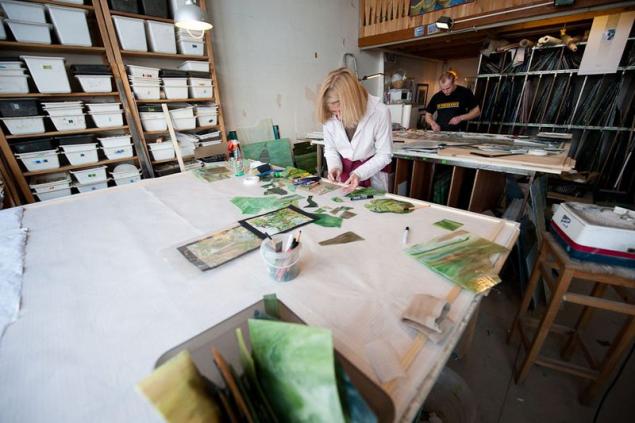
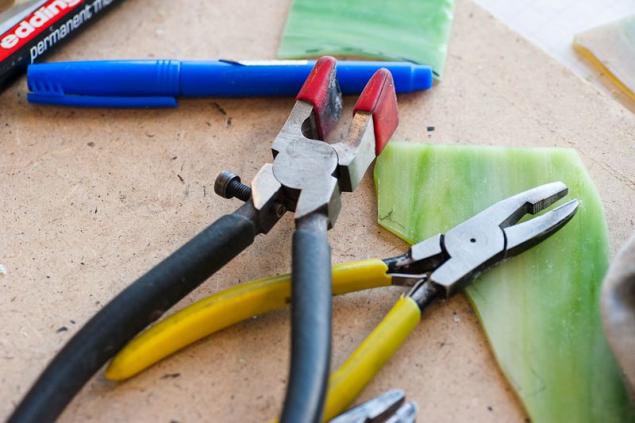
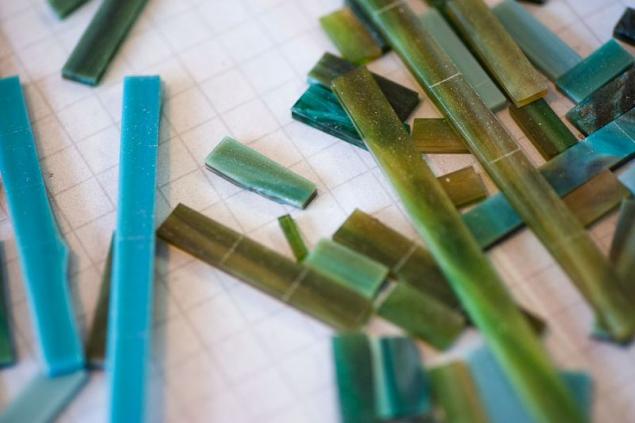
The walls stood tall racks with baths, each of which were ready modules - small rectangular pieces of glass. Narrow, pinned to the wall staircase led to a small balcony. At each step creaked underfoot and crunched pieces of glass - the master, so as not to break away from work, threw scraps on the floor.
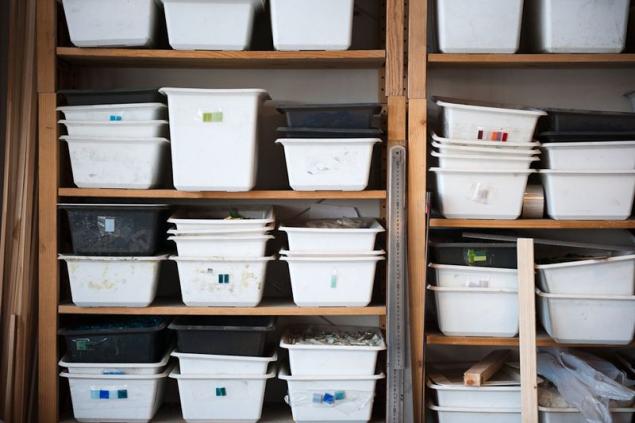
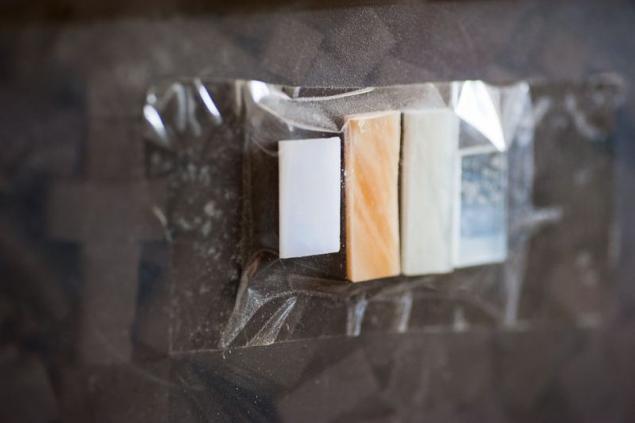
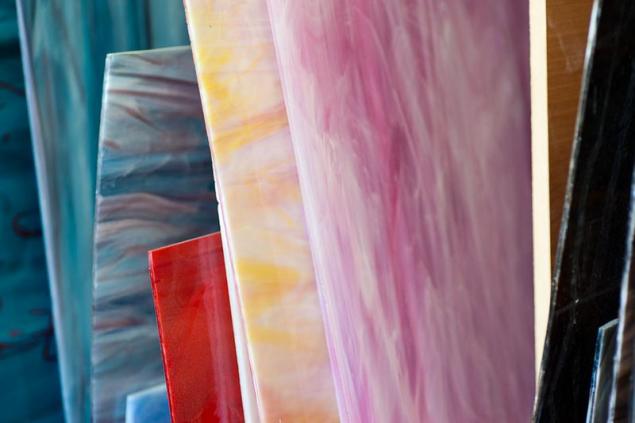
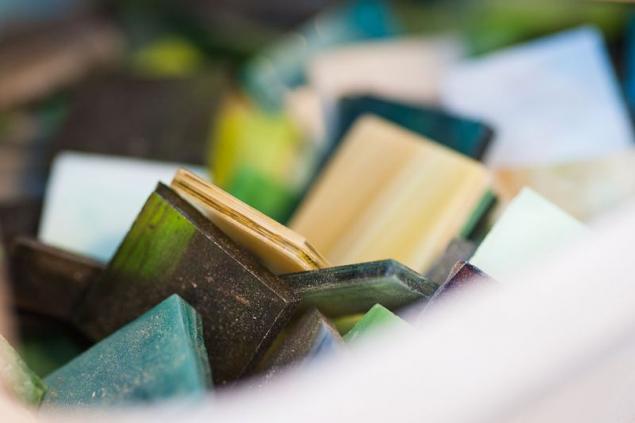
At first glance, the mosaic is not much different from the stained glass - the same pieces of glass, which must be cut and fit into the picture. But if you look closely, you open a sea of differences. "Everything starts with a cardboard - drawing future mosaic. Only when it comes to vitrazhistam with distinguished colors - there will be yellow, here - blue, we just see the general line and sketch "- told me one of the masters of Andrew.
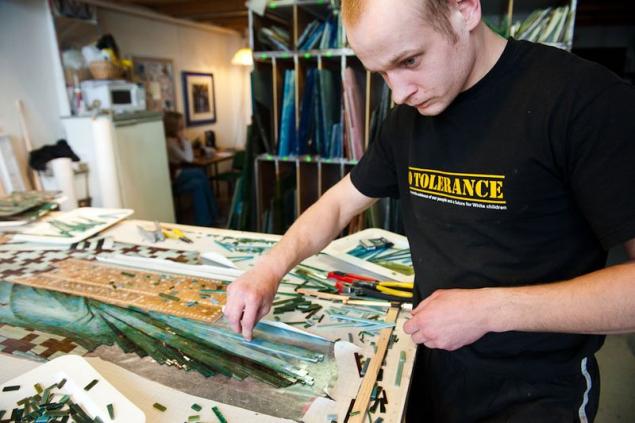
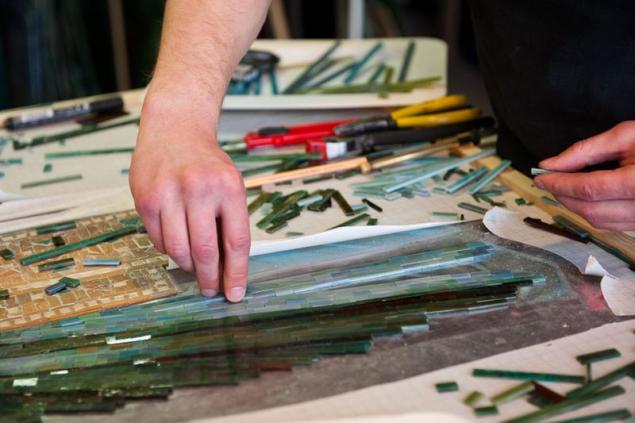
Today, the mosaic spread in two main ways. When a glass is cut exactly to the size of some area - the petal of a flower or a dragonfly wing - akin to the Florentine mosaic. In another, closer to the Roman mosaic, the picture is assembled from small rectangular pieces. "I do not like cut glass - you just depends on the colors that are on the finished sheet. Smalt closer to the painting - each module as a brush stroke. And here we have a lot more freedom - we are our own artists. Suppose I decided that the mosaic hair should be gold - and I do them in gold ».
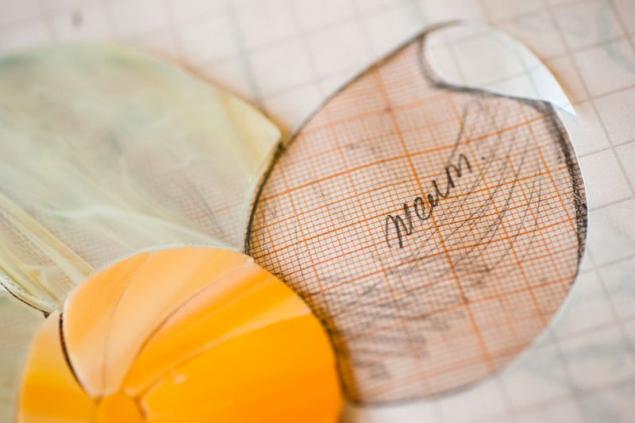
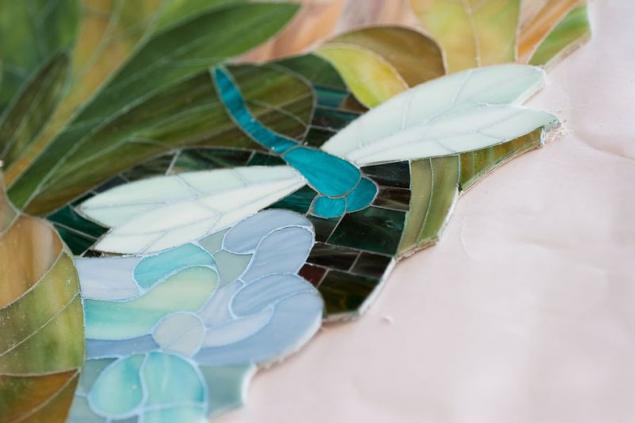
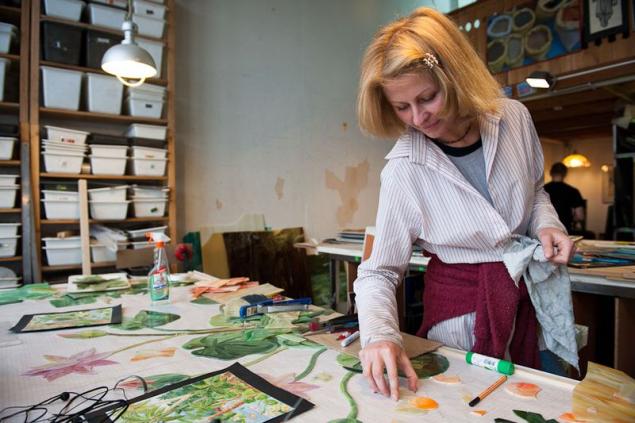
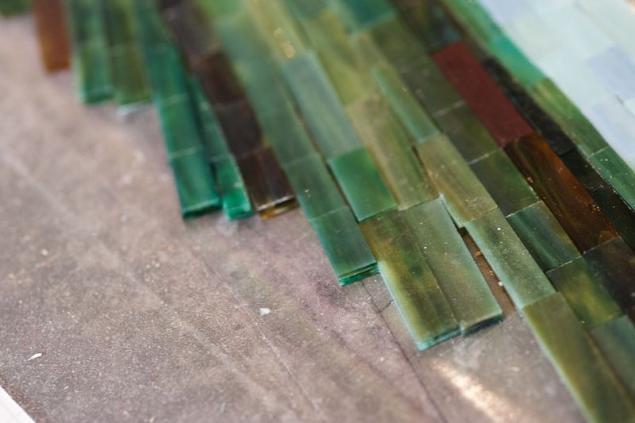
But this is not the only difference between the mosaics and stained glass. The work here is far more subtle - sometimes you have to spread the modules of size slightly more eyelashes. A still necessary to cut them from the glass and, if necessary, to grind. Customized modules to each other have to close, with the smallest gaps. Not for nothing is called the master of such work jewelry.
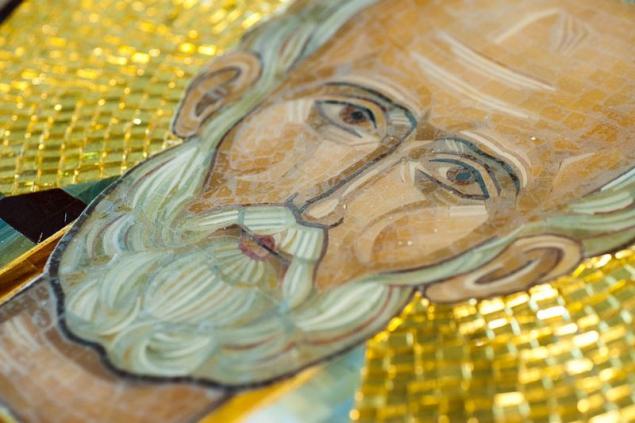
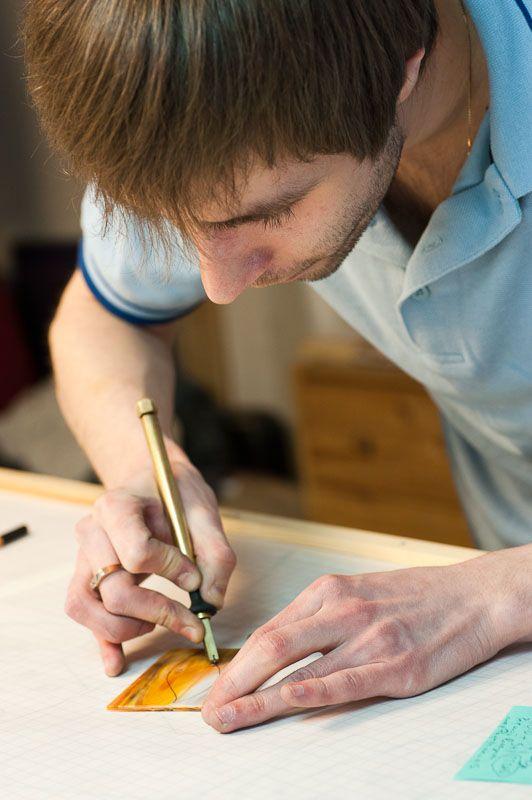
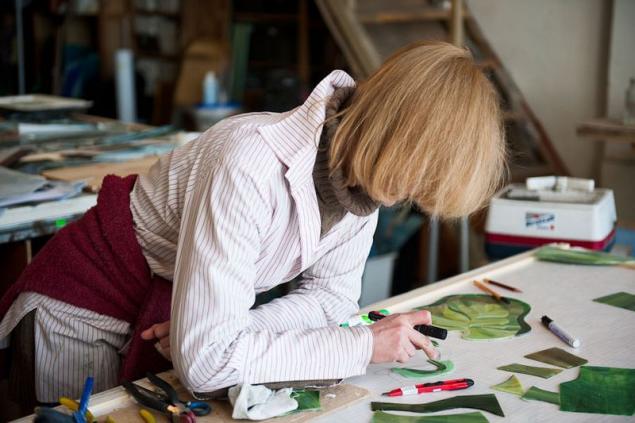
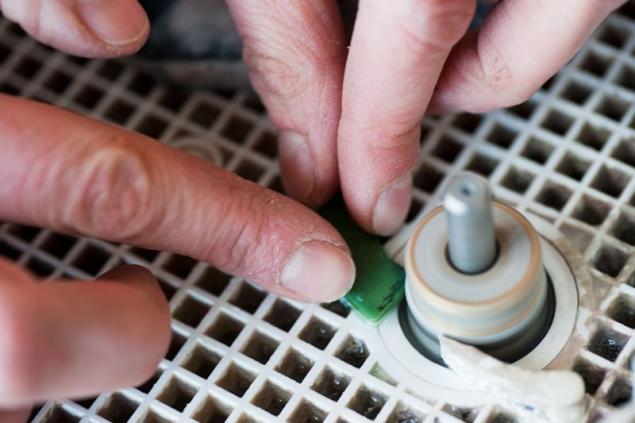
If necessary, the module can be on a special podshlifovat stanochke
"The modules we usually spread, starting with a particular element. Here, for example, berry - and Andrew showed me a sketch of the new mosaic and started to drive around with your finger angular stylized berries - I'll post it in the beginning, then a number around her, then another number. But sometimes it is the other way - that look like works Andryukha - and Andrew nodded toward another master who worked on the mosaic icon of Saint Nicholas - he first laid the face and hands, fixed them and put in a common panel. And now around them completes everything else ».
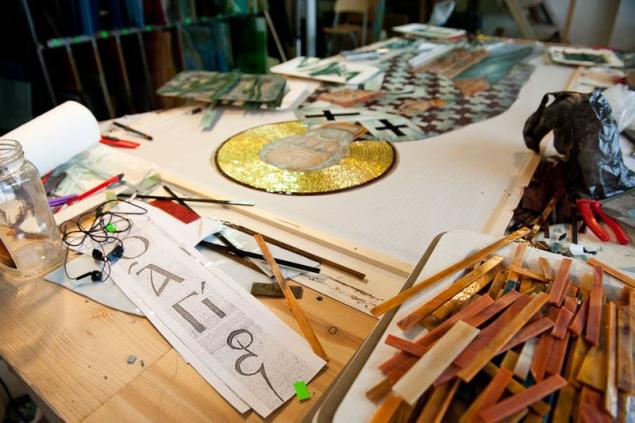
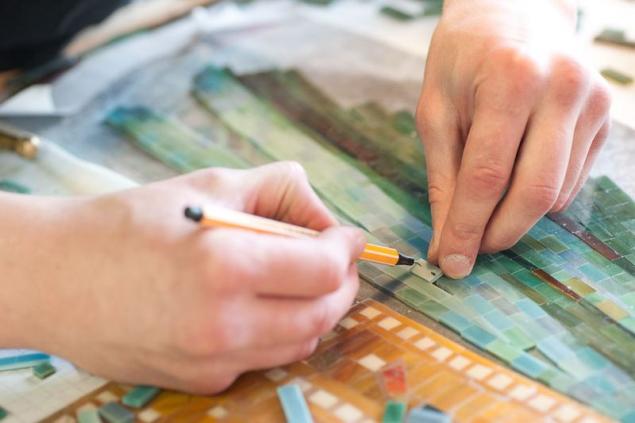
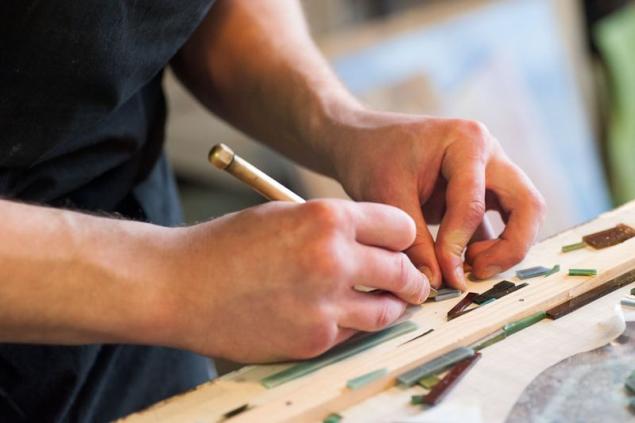
Most Mosaic in the workshop have art education, but Andrew to my question about how he started mosaics, with a grin replied: "I am here at all in the garage came to work, I have no artistic education. Come and ask me: "Mosaic ever spread?" Well, I said no. Nothing, they say, to learn. So learn what I have been working here for six years ».
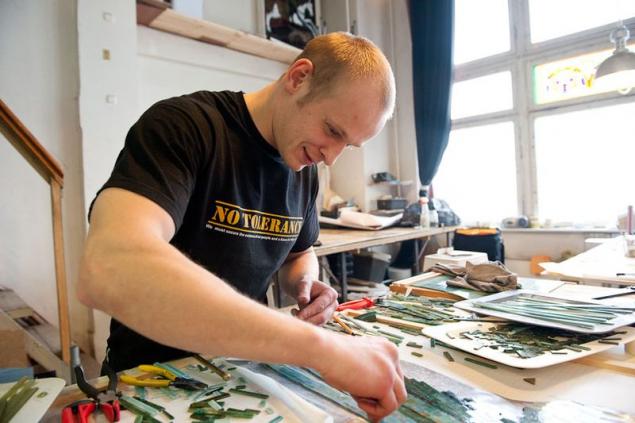
Modules spread on the mounting tape - Self-adhesive sheets, which keeps the pieces of glass in place. When the whole picture is assembled, on top of it the face of the paste Arakan - another self-adhesive sheet. Thereafter, mosaic flip and remove foil, and in its place put the foundation - a special fabric, which finally glued related arakalom the tiles. When the modules are firmly entrenched on the basis of Orphaned Arakan removed.
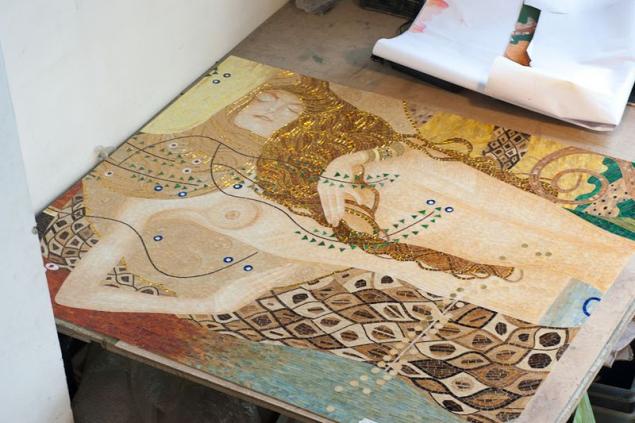
Mosaic based on Gustav Klimt's painting "Water Snake". Above this mosaic Andrew bezvylazno worked three months
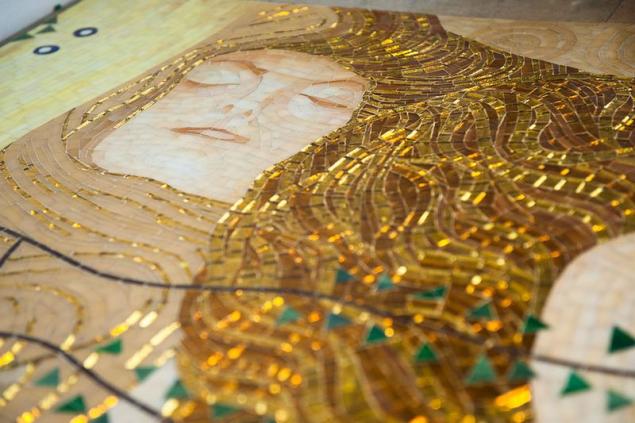
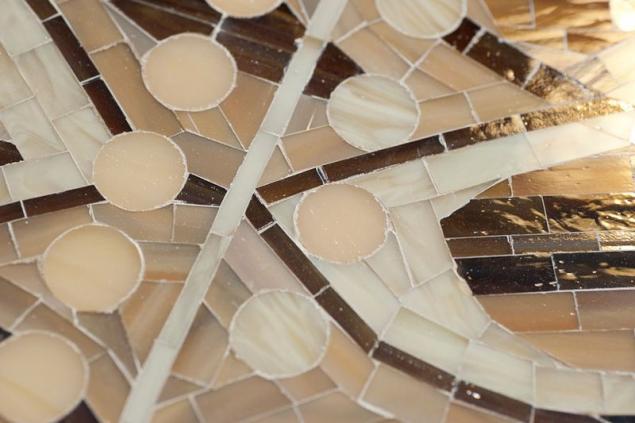
Such artful manipulations made to the artist saw in the recruitment front part of the puzzle - such as it would be after the mounting base. There are, however, a set of so-called reverse when mirror mosaic collected directly on arakale. Only here for a glass mosaic - whimsical thing: often one party may be strikingly different from the other in pattern and color, and to predict. To predict how it will look mosaic in the end, the reverse set will be very difficult.
"And then the fun begins - rubbing seams. The color of the grout selected modules and, if necessary, the required color is mixed. But then the work may change beyond recognition: the individual sections brighten, darken others, and some colors can merge. And to do this can not be - can only represent every time that happens in the end ».
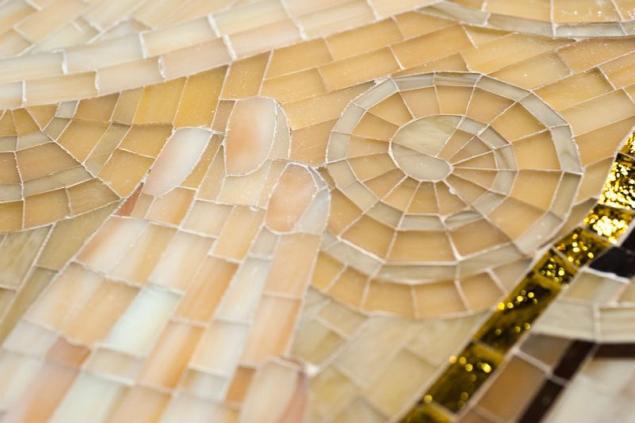
The work went on as usual - small pieces of glass, one after another lay on the table, adding up to a future picture. I finished the shoot, looked a little more work for Mosaic and then walked out of the studio. Before leaving, I looked into the studio office and met Leila. We talked - about art and photos on the internal affairs of the studio. "From any work can be tiring, even creative. Any artist can be exhausted, and then he needed a break. If we see that the man fell into a stupor, then try to give him some other work - make out the samples, go somewhere ».
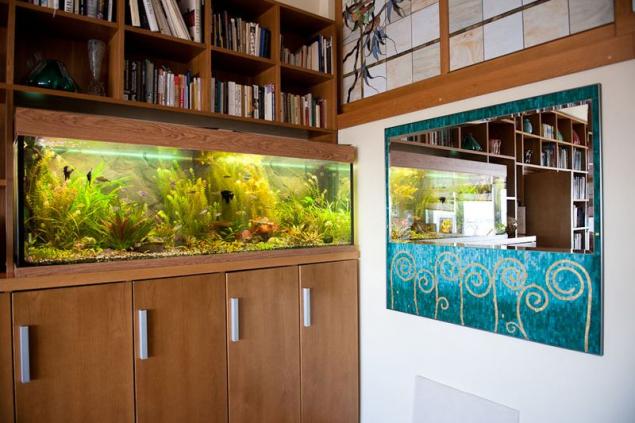
By the end of the conversation Leila took from under the table a large black box with samples of glass: "Now I'll show you what ... if they do not like it, nothing is sacred you do not." With these words she threw a cardboard cover, and my view appeared neat rows of thin plates. With burning eyes Leila began looking through them, and soon pulled one stёklyshko: inside the thin transparent squares flowed fancy colored stains. In the interior of the next square as if grown colony of mold, and another sample of white feathers pierced the air ».
"When it was all tired and have no strength, then that is what helps not give up and move on." And in the words of these feelings sounded much deeper than a simple devotion to the profession.
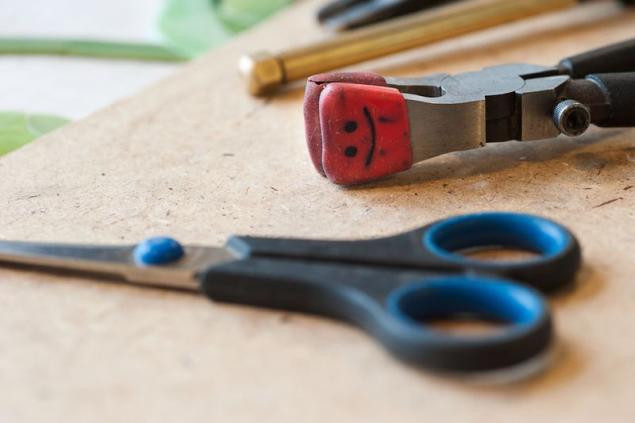
via Source

Twenty years ago, "Alexandria" was created as a stained glass studio, and I have already talked about how to work here in this technique. When you create a stained glass window is used very different - from transparent to dense. Over time, the remnants of dense, opaque glass accumulated quite a lot, and in the studio decided to try to put them in business - to begin to lay out the mosaic. From that moment has passed six years, and now the mosaic can be called the second core competence studio. For such important work had been trained and equipped master workshops.

In one of these workshops - a spacious room with high ceilings - I saw gather mosaic. Light rained from high windows lit up a huge table on which were laid out pictures of various stages of readiness. Along the edges of each table among the scattered pieces of glass were all kinds of tools: pliers, wire cutters tricky shapes, glass cutters, knives and markers. On two mosaics, bending, worked as a foreman.



The walls stood tall racks with baths, each of which were ready modules - small rectangular pieces of glass. Narrow, pinned to the wall staircase led to a small balcony. At each step creaked underfoot and crunched pieces of glass - the master, so as not to break away from work, threw scraps on the floor.




At first glance, the mosaic is not much different from the stained glass - the same pieces of glass, which must be cut and fit into the picture. But if you look closely, you open a sea of differences. "Everything starts with a cardboard - drawing future mosaic. Only when it comes to vitrazhistam with distinguished colors - there will be yellow, here - blue, we just see the general line and sketch "- told me one of the masters of Andrew.


Today, the mosaic spread in two main ways. When a glass is cut exactly to the size of some area - the petal of a flower or a dragonfly wing - akin to the Florentine mosaic. In another, closer to the Roman mosaic, the picture is assembled from small rectangular pieces. "I do not like cut glass - you just depends on the colors that are on the finished sheet. Smalt closer to the painting - each module as a brush stroke. And here we have a lot more freedom - we are our own artists. Suppose I decided that the mosaic hair should be gold - and I do them in gold ».




But this is not the only difference between the mosaics and stained glass. The work here is far more subtle - sometimes you have to spread the modules of size slightly more eyelashes. A still necessary to cut them from the glass and, if necessary, to grind. Customized modules to each other have to close, with the smallest gaps. Not for nothing is called the master of such work jewelry.




If necessary, the module can be on a special podshlifovat stanochke
"The modules we usually spread, starting with a particular element. Here, for example, berry - and Andrew showed me a sketch of the new mosaic and started to drive around with your finger angular stylized berries - I'll post it in the beginning, then a number around her, then another number. But sometimes it is the other way - that look like works Andryukha - and Andrew nodded toward another master who worked on the mosaic icon of Saint Nicholas - he first laid the face and hands, fixed them and put in a common panel. And now around them completes everything else ».



Most Mosaic in the workshop have art education, but Andrew to my question about how he started mosaics, with a grin replied: "I am here at all in the garage came to work, I have no artistic education. Come and ask me: "Mosaic ever spread?" Well, I said no. Nothing, they say, to learn. So learn what I have been working here for six years ».

Modules spread on the mounting tape - Self-adhesive sheets, which keeps the pieces of glass in place. When the whole picture is assembled, on top of it the face of the paste Arakan - another self-adhesive sheet. Thereafter, mosaic flip and remove foil, and in its place put the foundation - a special fabric, which finally glued related arakalom the tiles. When the modules are firmly entrenched on the basis of Orphaned Arakan removed.

Mosaic based on Gustav Klimt's painting "Water Snake". Above this mosaic Andrew bezvylazno worked three months


Such artful manipulations made to the artist saw in the recruitment front part of the puzzle - such as it would be after the mounting base. There are, however, a set of so-called reverse when mirror mosaic collected directly on arakale. Only here for a glass mosaic - whimsical thing: often one party may be strikingly different from the other in pattern and color, and to predict. To predict how it will look mosaic in the end, the reverse set will be very difficult.
"And then the fun begins - rubbing seams. The color of the grout selected modules and, if necessary, the required color is mixed. But then the work may change beyond recognition: the individual sections brighten, darken others, and some colors can merge. And to do this can not be - can only represent every time that happens in the end ».

The work went on as usual - small pieces of glass, one after another lay on the table, adding up to a future picture. I finished the shoot, looked a little more work for Mosaic and then walked out of the studio. Before leaving, I looked into the studio office and met Leila. We talked - about art and photos on the internal affairs of the studio. "From any work can be tiring, even creative. Any artist can be exhausted, and then he needed a break. If we see that the man fell into a stupor, then try to give him some other work - make out the samples, go somewhere ».

By the end of the conversation Leila took from under the table a large black box with samples of glass: "Now I'll show you what ... if they do not like it, nothing is sacred you do not." With these words she threw a cardboard cover, and my view appeared neat rows of thin plates. With burning eyes Leila began looking through them, and soon pulled one stёklyshko: inside the thin transparent squares flowed fancy colored stains. In the interior of the next square as if grown colony of mold, and another sample of white feathers pierced the air ».
"When it was all tired and have no strength, then that is what helps not give up and move on." And in the words of these feelings sounded much deeper than a simple devotion to the profession.

via Source
